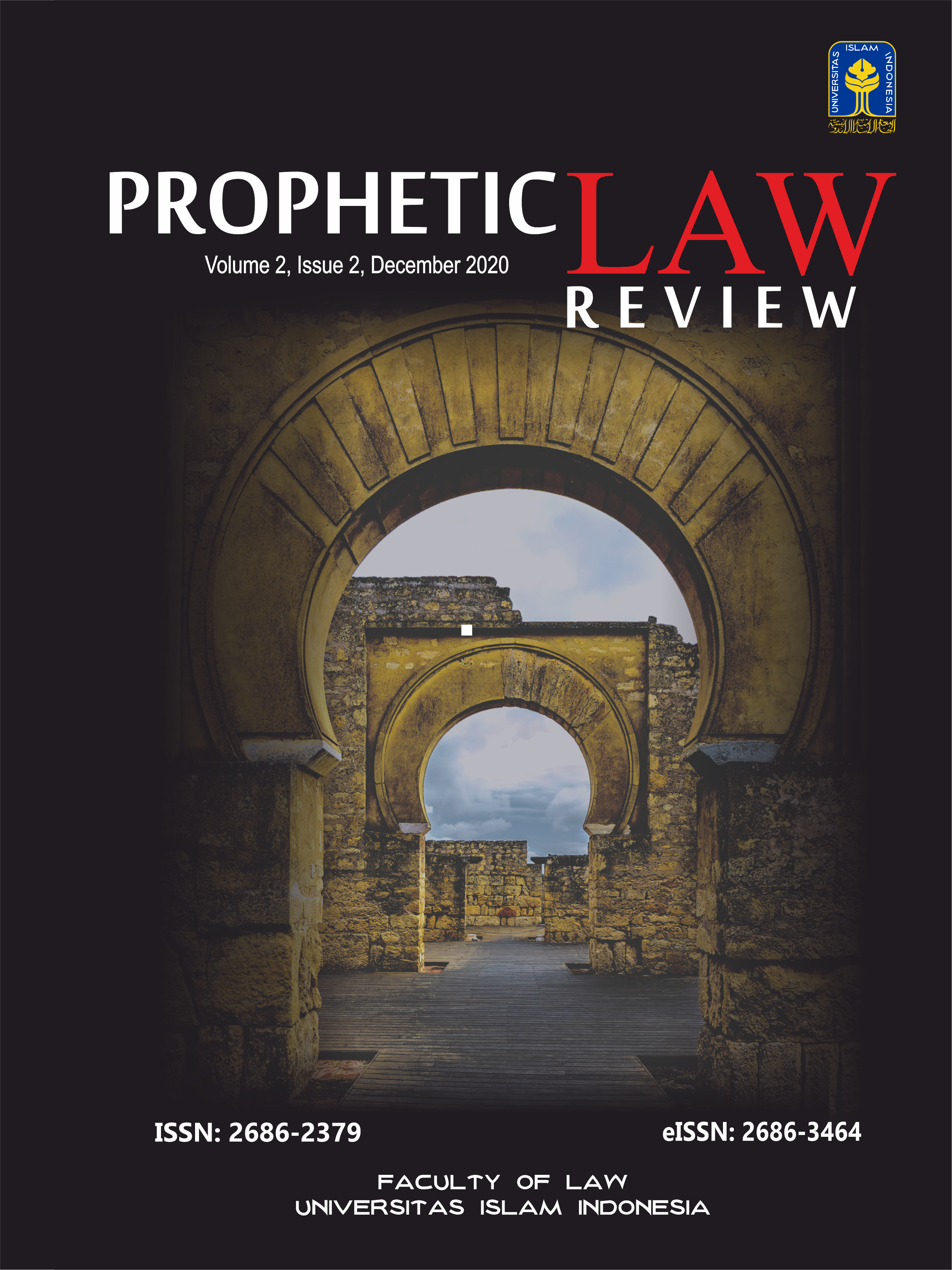Main Article Content
Abstract
The objective of this study was to determine how Notary can play a role in creating a better legal certainty in relation to drawing up a marriage agreement after the issuance of Constitutional Court Decision Number 69/PUU-XIII/2015 on October 27, 2016. This was a normative study using a case approach as well as a statute approach and a conceptual approach. The results showed that after the issuance of Constitutional Court Decision Number 69/PUU-XIII/2015 on October 27, 2016, marriage agreements shall no longer be regarded as something which is materialistic, selfish, unethical, or not in accordance with the Eastern culture among today's society. The Constitutional Court Decision has indirectly demonstrated another function and changed the general opinion of marriage agreements which, so far, are considered to only contain or only focus on issues related to the arrangement of property in marriage. There is actually a principle difference between the Law of Marriage and the Civil Code of the Republic of Indonesia, particularly after the issuance of Constitutional Court Decision. The law no longer requires Notarial Deed for a marriage agreement. However, the law requires the agreement to be written, and it can be made any time as long as the marriage is still ongoing, and the agreement can contain matters other than property in marriage, such as citizenship issues. In order to create a better legal certainty, justice and expediency, the marriage agreement should be drawn up in the presence of a Notary.
Keywords: Notary; Prenuptial agreement; Legal certainty
Peran Notaris Dalam Membuat Perjanjian Perkawinan Pascaputusan Mahkamah Konstitusi Nomor 69/Puu-Xiii/2015
Abstrak
Penelitian ini bertujuan untuk mengetahui peran Notaris menciptakan kepastian hukum yang lebih baik terkait dengan pembuatan perjanjian perkawinan setelah diterbitkannya Putusan Mahkamah Konstitusi Nomor 69/PUU-XIII/2015 pada 27 Oktober 2016. Penelitian ini merupakan penelitian normatif dengan menggunakan pendekatan kasus serta pendekatan perundang-undangan dan konseptual. Hasil penelitian menunjukkan bahwa setelah diterbitkannya Putusan Mahkamah Konstitusi Nomor 69/PUU-XIII/2015 pada 27 Oktober 2016, perjanjian perkawinan tidak lagi dianggap sebagai sesuatu yang materialistis, mementingkan diri sendiri, tidak etis, atau tidak sesuai dengan budaya Timur dari kalangan masyarakat saat ini. Putusan MK tersebut secara tidak langsung telah menunjukkan fungsi lain dan mengubah pandangan umum tentang perjanjian perkawinan yang selama ini dianggap hanya memuat, atau hanya terfokus pada, persoalan-persoalan yang berkaitan dengan pengaturan harta benda dalam perkawinan. Sebenarnya, ada perbedaan prinsip antara Hukum Perkawinan dan KUHPerdata Indonesia, terutama setelah dikeluarkannya Putusan Mahkamah Konstitusi. Undang-undang tidak lagi mensyaratkan Akta Notaris untuk perjanjian perkawinan. Namun, undang-undang mensyaratkan perjanjian itu harus tertulis, dapat dibuat kapan saja selama perkawinan masih berlangsung, dan perjanjian itu dapat memuat hal-hal selain harta benda dalam perkawinan, seperti masalah kewarganegaraan. Untuk menciptakan kepastian, keadilan, dan kemanfaatan hukum yang lebih baik, maka perjanjian perkawinan harus dibuat di hadapan Notaris.
Kata kunci: Notaris, Perjanjian Perkawinan, Kepastian Hukum
Keywords
Article Details
Authors who publish with this journal agree to the following terms:
a. Authors retain copyright and grant the journal right of first publication with the work simultaneously licensed under a Creative Commons Attribution License that allows others to share the work with an acknowledgement of the work's authorship and initial publication in this journal.
b. Authors are able to enter into separate, additional contractual arrangements for the non-exclusive distribution of the journal's published version of the work (e.g., post it to an institutional repository or publish it in a book), with an acknowledgement of its initial publication in this journal.
c. Authors are permitted and encouraged to post their work online (e.g., in institutional repositories or on their website) prior to and during the submission process, as it can lead to productive exchanges, as well as earlier and greater citation of published work (See The Effect of Open Access).
References
- Indonesian Legislation
- Law No. 1 of 1974 on Marriage
- Law No. 2 of 2014 on Amendment of Law No. 30 of 2004 on Notary
- Law No. 5 of 1960 on the basic Principles of Agrarian Law
- Law No. 12 of 2006 on the Republic of Indonesian Citizenship
- Law No. 16 of 2019 on the Amendment of Law No. 1 of 1974 on Marriage
- Law No. 30 of 2004 on Notary
- Indonesian Court Decision
- Ike Farida (2016) Constitutional Court Decision No. 69/PUU-XIII/2015
- Endang Wasrinah et al (2018) Constitutional Court Decision No. 22/PUU-XV/2017
References
Indonesian Legislation
Law No. 1 of 1974 on Marriage
Law No. 2 of 2014 on Amendment of Law No. 30 of 2004 on Notary
Law No. 5 of 1960 on the basic Principles of Agrarian Law
Law No. 12 of 2006 on the Republic of Indonesian Citizenship
Law No. 16 of 2019 on the Amendment of Law No. 1 of 1974 on Marriage
Law No. 30 of 2004 on Notary
Indonesian Court Decision
Ike Farida (2016) Constitutional Court Decision No. 69/PUU-XIII/2015
Endang Wasrinah et al (2018) Constitutional Court Decision No. 22/PUU-XV/2017




